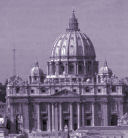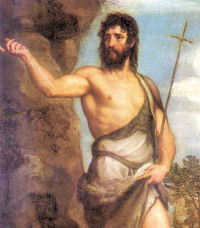Advent: December 14th
Third Sunday of Advent
Other Titles: Day 1 O Antiphons: O Sapientia (O Wisdom)
» Enjoy our Liturgical Seasons series of e-books!
Today the Church celebrates the Third Sunday of Advent, known as Gaudete Sunday. The term Gaudete refers to the first word of the Entrance Antiphon "Rejoice". Rose vestments are worn to emphasize our joy that Christmas is near and we light the rose candle on our Advent wreath. The readings are taken from Cycle C. This week is concerned with the Lord's coming as Judge of all men at the end of time. The feast of St. John of the Cross, which falls on December 14, is not celebrated today since Sunday takes priority.
"Rejoice: the Lord is nigh." As Christmas draws near, the Church emphasizes the joy which should be in our hearts at all that the birth of our Saviour means for us. St. Paul bases Christian joy on the assurance of the salvation brought to us by Christ; he desires it to be so firmly established in the soul that no reason of human anxiety or sadness can ever overcome it, since the great peace of God henceforth must predominate over every other feeling. Yet for St. Paul this coming of our Lord is not His birth at Bethlehem but His second coming. The great joy of Christians is to see the day drawing nigh when the Lord will come again in His glory to lead them into His kingdom. The oft-repeated veni ("come") of Advent is an echo not only of the prophets but also of the conclusion of the Apocalypse of St. John: "Come, Lord Jesus," the last words of the New Testament.
The first reading is taken from Zephaniah 3:14-18a. The theme of the first two weeks is carried on with this week's selection from Zephaniah. "On that day" the people of God will be restored. "The Lord, your God, is in your midst."
The second reading is taken from Philippians 4:4-7. "Rejoice in the Lord always. I shall say it again: rejoice! Your kindness should be known to all. The Lord is near." St. Paul writes this letter from prison and shows us that dispite our living conditions it is possible to have joy. We must let our joy overflow to others and through our generosity give them hope.
The Gospel of this Sunday, Luke 3:10-18, completing last Sunday's, presents us with John the Baptist's testimony to Jesus: the Precursor effaces himself before the only One who is of importance, the long-awaited Messias.
![]()
Salvation History Meditation — Jonah
During Advent we review our salvation history. Today we reflect on Jonah. As Jonah remained in the whale three days, so Christ remained three days in the earth after His death.
Symbols: Whale.
Suggested Readings: Jonah 1:11-15.
Advent Reflection: Stepping Out of the Night
What is Advent? Many answers can be given. We can grumble and say that it is nothing but a pretext for hectic activity and commercialism, prettified with sentimental clichés in which people stopped believing ages ago. In many cases this may be true, but it is not the whole picture.
We can also say that Advent is a time when a kindness that is otherwise almost entirely forgotten is mobilized; namely, the willingness to think of others and give them a token of kindness. Finally we can say that Advent is a time when old customs live again, for instance, in the singing of carols which takes place all over the country. In the melodies and the words of these carols, something of the simplicity, imagination and glad strength of the faith of our forefathers makes itself heard in our age, bringing consolation and encouraging us perhaps to have another go at that faith which could make people so glad in such hard times.
This latter kind of experience of Advent brings us quite close to what the Christian tradition has in mind with this season. It has expressed its view of Advent in the Bible texts which it took as the season's signposts. I will mention just one of them, a few verses from Paul's letter to the Christians in Rome. There he says, "... it is full time now for you to wake from sleep...the night is far gone, the day is at hand. Let us then cast off the works of darkness and put on the armor of light, let us conduct ourselves becomingly as in the day, not in revelling and drunkenness, not in debauchery and licentiousness, not in quarrelling and jealousy. But put on the Lord Jesus Christ..." (Rom 13:11-14).
There are many people, of course, who urge us to get up and awake; "Germany, awake!" was the cry of those who, years ago, were bent on deluding the nation; and today too there are awakenings and uprisings that lead further into darkness instead of out of it. What does Paul mean? He puts very clearly what he means by "night" by speaking of "revelling and drunkenness, debauchery, licentiousness, quarrelling and jealousy". For Paul, nocturnal revelling with all that goes with it stands for the dark side of human nature, man's being "asleep". For him it becomes a symbol of the pagan world as such, submerged in material things, held fast in the darkness that prevails where there is no truth and which, despite all its decibels and hectic activity, is asleep, because it lives unaware of genuine reality, of the real human vocation.
Nocturnal orgies as the image of a world in ruin—are we not appalled to see how aptly Paul characterizes our present times, which are returning to paganism? For us, "rising from sleep" means arising from conformity with the world and with the times and having the courage to believe and to shake off the dream that causes us to bypass our true vocation and our best possibilities. Perhaps the Advent hymns we hear every year may be lights to us, indicating our path, making us look up and recognize that there are greater promises than those of money, power and pleasure. Being awake for God and for other people—that is the kind of "waking" that Advent has in mind, the wakefulness which discovers the light and brightens the world.
—Joseph Cardinal Ratzinger, Seek That Which is Above

Third Sunday of Advent, Guadete Sunday
Station with San Pietro in Vaticano (St. Peter's in the Vatican):
The Station is at St. Peter's in the Vatican. After the two great basilicas chosen for the first and for the second Sunday in Advent, we come to St. Peter's in the Vatican, a church which shares with the Lateran the chief feasts of the year. It was selected as the station for today, because on this Sunday occurred the final scrutiny or examination of those candidates preparing for the Ordinations usually held on Ember Saturday in December. The original basilica was built by Constantine in 323 over the place where St. Peter was buried.
For more on San Pietro in Vaticano, see:
For further information on the Station Churches, see The Stational Church.






